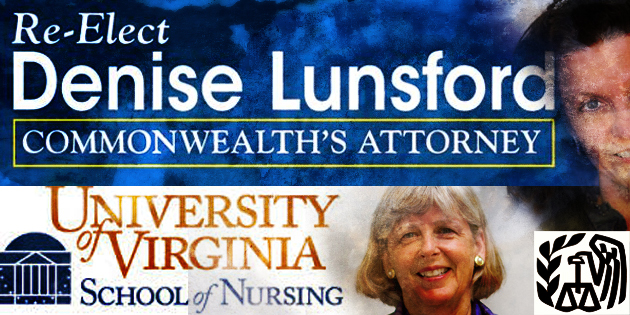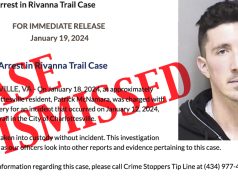In apparent contradiction with federal tax law and University of Virginia policy regarding political activity, a prominent UVa faculty member is hosting a campaign event for embattled Albemarle County Commonwealth’s Attorney, Democrat Denise Lunsford.
The function, promoted on Facebook using “Re-Elect Denise Lunsford” campaign signage, is hosted by Dorrie Fontaine, Dean of the University of Virginia School of Nursing—and a long-time financial supporter of Democrat candidates. It is scheduled to take place October 1 in Pavilion IV, at UVa.
Confirming the coordinated, partisan political nature of this gathering, those with questions about the event are directed to contact, via email, Lunsford’s campaign manager, Thomas Cross.
The American Council on Education condemns one-sided political events like Fontaine’s tacit pro-Lunsford re-election rally as “clearly off limits” for tax-exempt institutions like UVa:
There are certain uses of institutional resources that are clearly off limits. An institution simply cannot help a candidate with fundraising, cannot reimburse employees for campaign contributions, and cannot sponsor events that favor a particular candidate. Simply put, the biased use of resources is unacceptable in all cases. [emphasis added]
The council also warns against using “voter registration” as this event does, a bogus cover for targeted political activity:
Voter education, voter registration, and get-out-the-vote campaigns: These are areas where nonprofits, including colleges and universities, have a particular tendency to draw IRS ire. Even subtle bias is strictly forbidden. For example, it would be impermissible for voter registration and get-out-the-vote campaigns to target voters from a particular party or court supporters for a particular candidate.
Political Electioneering On Campus, a legal brief from attorney Milton Cerny of McGuireWoods, admonishes colleges and universities to abide by IRS rules:
But as tax-exempt 501(c)(3) organizations, colleges and universities must abide by specific rules concerning the political activity they permit on campus and the political activity engaged in by administrators, faculty and staff.
Cerny goes on to legally define partisan campus activities:
Activities evidencing a preference or opposition to a candidate, a political party or candidates who have taken particular positions will not qualify as nonpartisan. IRS will look to a program’s substance and not its form under a facts and circumstances test.
And prohibited activities:
- Making contributions to candidates or parties, including “in kind” contributions of services, publicity, advertising and paid staff time and use of facilities (xeroxing, postage meter, etc.). [emphasis added]
Coordinating activities with a candidate.
Cerny then discusses political use of university facilities:
Some of the factors to be considered in determining whether the organization has engaged in political campaign intervention include the following:
- Whether the good, service or facility is available to candidates in the same election on an equal basis;
- Whether the good, service or facility is available only to candidates and not to the general public;
- Whether the fees charged to candidates are at the organization’s customary and usual rates; and
- Whether the activity is an ongoing activity of the organization or whether it is conducted only for a particular candidate.
The presence of a link from UVa’s official calendar to the Lunsford event may present another problem. According to Cerny:
An organization has control over whether it establishes a link to another site. When an organization establishes a link to another website, the organization is responsible for the consequences of establishing and maintaining that link, even if the organization does not have control over the content of the linked site.
The facts and circumstances to be considered include, but are not limited to, the context for the link on the organization’s website, whether all candidates are represented, any exempt purpose served by offering the link, and the directness of the links between the organization’s website and the web page that contains material favoring or opposing a candidate for public office.
And, candidate appearances at universities must meet certain criteria in order to stay within IRS guidelines:
When a candidate is invited to speak at an organization event in his or her capacity as a political candidate, factors in determining whether the organization participated or intervened in a political campaign include the following:
- Whether the organization provides an equal opportunity to participate to political candidates seeking the same office.
- Whether the organization indicates any support for or opposition to the candidate (including candidate introductions and communications concerning the candidate’s attendance).
- Whether the candidate’s statement is delivered close in time to the election.
- Whether the statement makes reference to voting or an election. [emphasis added]
- Whether the issue addressed in the communication has been raised as an issue distinguishing candidates for a given office.
- Whether the communication is part of an ongoing series of communications by the organization on an issue that they cover independently of the timing of any election.
- Whether the timing of the communication and identification of the candidate are related to a nonelectoral event such as a scheduled vote on specific legislation by an officeholder who also happens to be a candidate for public office.
Finally, Cerny warns of IRS consequences for political campaigning in favor of a particular candidate:
The IRS has the authority to revoke the § 501(c)(3) tax-exempt status of a college or university that has participated or intervened in (including publishing or distributing statements) any political campaign on behalf of (or in opposition to) any candidate for public office.
The University of Virginia—with well-paid legal- and tax-compliance departments—should know better than to promote and link to a partisan political soirée on the school’s official calendar and to host such an event in taxpayer-funded buildings on Grounds. At the very least, Dean Fontaine should have included a political non-endorsement disclaimer in order to protect the University’s tax-exempt position.
Commonwealth’s Attorney, Denise Lunsford, should know better than to consume public resources through participation in and coordination of a campaign event at the University of Virginia—especially given her elected position and the assumed inferential knowledge of the law. But bad choices, controversy, and questionable affiliations have marked Denise Lunsford’s political career and all in all, this is just another brick in the (serpentine) wall.









This coruuption sure stinks to high heavens!! What's the next step, Rob Schilling?
[…] previously reported by The Schilling Show, a re-election campaign event for Democrat Commonwealth’s Attorney, Denise […]
[…] reported on today’s edition of The Schilling Show on WINA, embattled Commonwealth’s Attorney, Denise Lunsford, has been sued over violations of the Virginia Freedom of Information […]
[…] campaign, a potentially embarrassing FOIA request, a lawsuit related to the FOIA request, questionable fundraising events, blowback from the bungled persecution of Mark Weiner, and widely reported personal issues, […]
[…] Albemarle County Commonwealth’s Attorney, Denise Lunsford, has procedurally sidestepped a Virginia Freedom of Information Act Request (FOIA) for information […]